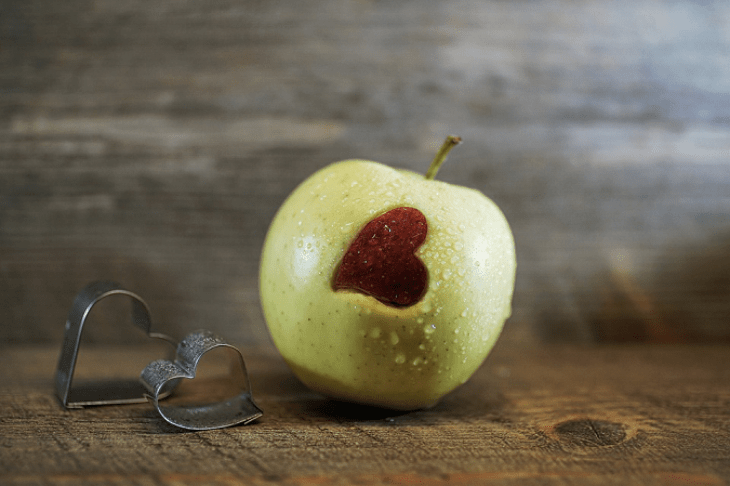The Pros and Cons of Fresh Apple Juice You Should Know

Apples are one of those readily available and affordable fruits that are rich in nutritional value. Some people prefer eating their apples whole, while others prefer to juice them.
Eating whole apples is recommended because they give lots of health benefits due to the nutritional value of the peels and the flesh. However, drinking apple juice once in a while is also an excellent way to consume the fruit in a different form.
When making apple juice, it is recommended to use a masticating juicer to make your juice (as opposed to conventional centrifugal juicers), because the produced juice is crushed at a slow speed and does not introduce as much heat and oxygen as with a centrifugal juicer.
Masticating juicers grind the fruit at a speed of around 80-100 RPM to make the juice. The juice tends to have more nutritional value because it is thicker and contains the ground form of a fruit. These juicers also produce a higher yield, so you get more out of your fruit.
But what are some of the pros and cons of fresh apple juice? Is apple juice really that good for you?
Benefits of Fresh Apple Juice
Among the many benefits of apple juice you should know about are:
1. Promotes Good Heart Health
Apple juice contains plant compounds called polyphenols, which is associated with helping protect human cells from disease-promoting oxidative stress and inflammation.
Polyphenols in apple juice is particularly beneficial for promoting heart health. According to some studies, polyphenols may prevent LDL (bad) cholesterol from building up in your arteries. Higher levels of oxidized LDL are linked to an increased risk of heart attack and stroke
Cloudy juice with pulp is higher in polyphenols than clear juice, although clear apple juice also has potential for boosting protection from heart disease.
The adage that an apple a day keeps the doctor away bears more meaning when you consider these heart health benefits that apple juice provides.

2. Relieves Constipation
Apple juice contains both dietary fiber and sorbitol, a component that gives a laxative effect whenever you have problems with indigestion or constipation. According to U.S. Dietary guidelines, a standard apple, with skin, contains 4.8 g of dietary fiber.
Apple juice is also rich in pectin, which is a water-soluble fiber that can help with bowel movement, and iron that helps relieve most gastrointestinal issues. Apple juice for babies works wonders, especially if they get constipated often.
Research also shows that soluble fiber can lower cholesterol levels, which in turn reduces the risk of heart disease. Accumulation of cholesterol is the leading cause of heart disease among humans. Cholesterol accumulates as a result of eating foods rich in saturated fats.
When cholesterol accumulates, it forms plaques on the arteries and other blood vessels. Plague filled blood vessels usually shrink, implying that blood doesn’t sufficiently reach the target organs. This is a cause for why we witness cases of heart attack and other heart-related problems.
The good news is, if you drink fresh apple juice often, it can not only help to relieve constipation, but also promote a healthy heart.
3. Good for Hydration
Apple juice is an excellent source of hydration compared to whole fruits. Medical practitioners have even associated drinking apple juice when sick with faster rehydration and recovery process.
The juice contains about 88 percent water content and it tastes great. Thus, the juice is a great choice of hydration for sick people or those who don’t prefer taking plain water.
Is it a busy day with warm weather? Have you broken some sweat from your morning jog? Then, apple juice is your best bet if you want to hydrate your body.
Cons of Fresh Apple Juice

Despite the many apple juice health benefits, some of its downsides and health risks include:
1. Weight Gain
Apple juice, just like other fruit drinks, doesn’t fill your stomach fast. It’s possible to drink a lot of juice at once.
The juices usually have added sugars and a lot of carbohydrates that increase your caloric intake. It’s, therefore, possible to experience weight gains if you regularly take fresh apple juice as opposed to whole apples.
2. Tooth Decay
It comes as a no brainer that if you consume foods or drinks rich in sugars, you risk tooth decay problems.
Sugars contained in fresh apple juices create a good thriving environment in our mouths, which consequently leads to decay of teeth.
3. Low vitamins and Mineral content
If you want to gain the nutritional value of apples, you’d rather eat it whole. Apple juice has low vitamin and mineral content. A 250 ml glass of apple juice contains less than 10 percent of the required daily intake of vitamins and minerals for human beings.
If you make a comparison of apple juice VS orange juice, you’d be surprised to know that orange juice has more Vitamin C and B.

A serving of apple juice Vitamin C content is usually about 0.9 milligrams. In comparison, orange juice has about 124 milligrams of Vitamin C per serving.
It’s no wonder why most fresh apple juices are fortified with Vitamin C and other minerals. However, if you don’t want to take the fortified apple juice, you should supplement your diet with other whole fruits.
In Conclusion
Apple juice is a delicacy that offers proper hydration, relieves constipation, and maintains a healthy heart. However, beware that the juice can also bring some disadvantages, such as weight gain, tooth decays, and low amounts of vitamins and minerals.
Updated: Originally published November 2022.




















